
Creating a structured approach to the activities and lessons for little ones is essential for fostering their growth and development. A well-organized plan can help caregivers and educators maintain a balanced routine that supports various learning experiences. By outlining daily tasks and themes, adults can ensure that children engage in a range of stimulating activities that promote exploration and creativity.
Effective organization plays a crucial role in maximizing educational opportunities. When caregivers can visualize the week’s events, they can better allocate resources and prepare materials in advance. This not only enhances the learning environment but also allows for flexibility in adapting to the needs and interests of the young learners.
Incorporating a systematic framework for planning can significantly improve the overall experience for both educators and children. By tracking themes and activities, caregivers can evaluate progress and make informed adjustments, ensuring that each child receives the attention and encouragement they deserve.
Preschool Weekly Calendar Template Overview
The structured layout designed for early childhood environments serves as a crucial tool for organizing daily activities and events. This framework allows educators and caregivers to plan engaging experiences that foster learning and development in young children.
Such a layout provides a clear visual representation of planned events, enabling seamless communication among staff, parents, and children. This organized approach not only enhances the management of daily routines but also promotes a sense of anticipation and excitement among the little ones.
By incorporating various activities, this organized format can cater to different learning styles, ensuring that each child is engaged and able to thrive in their educational journey. Overall, the use of this structured design supports an enriching environment where children can explore and learn effectively.
Importance of Structured Weekly Plans
Creating organized schedules is essential for effective management of activities and ensuring smooth transitions throughout the week. These plans provide a framework that allows for better time allocation, clearer communication, and enhanced engagement among participants. By establishing a consistent routine, individuals can foster a sense of security and predictability.
Benefits of Organized Scheduling
- Enhanced Time Management: A well-defined plan helps prioritize tasks and allocate time effectively, reducing last-minute stress.
- Improved Communication: Clear schedules can be shared with all stakeholders, ensuring everyone is informed and on the same page.
- Increased Engagement: Structured activities encourage participation and provide opportunities for learning and growth.
Creating a Framework for Success
- Identify key activities that need to be incorporated into the plan.
- Allocate specific time slots for each task to ensure a balanced distribution of responsibilities.
- Review and adjust the plan regularly based on feedback and changing needs.
Key Features of a Calendar Template
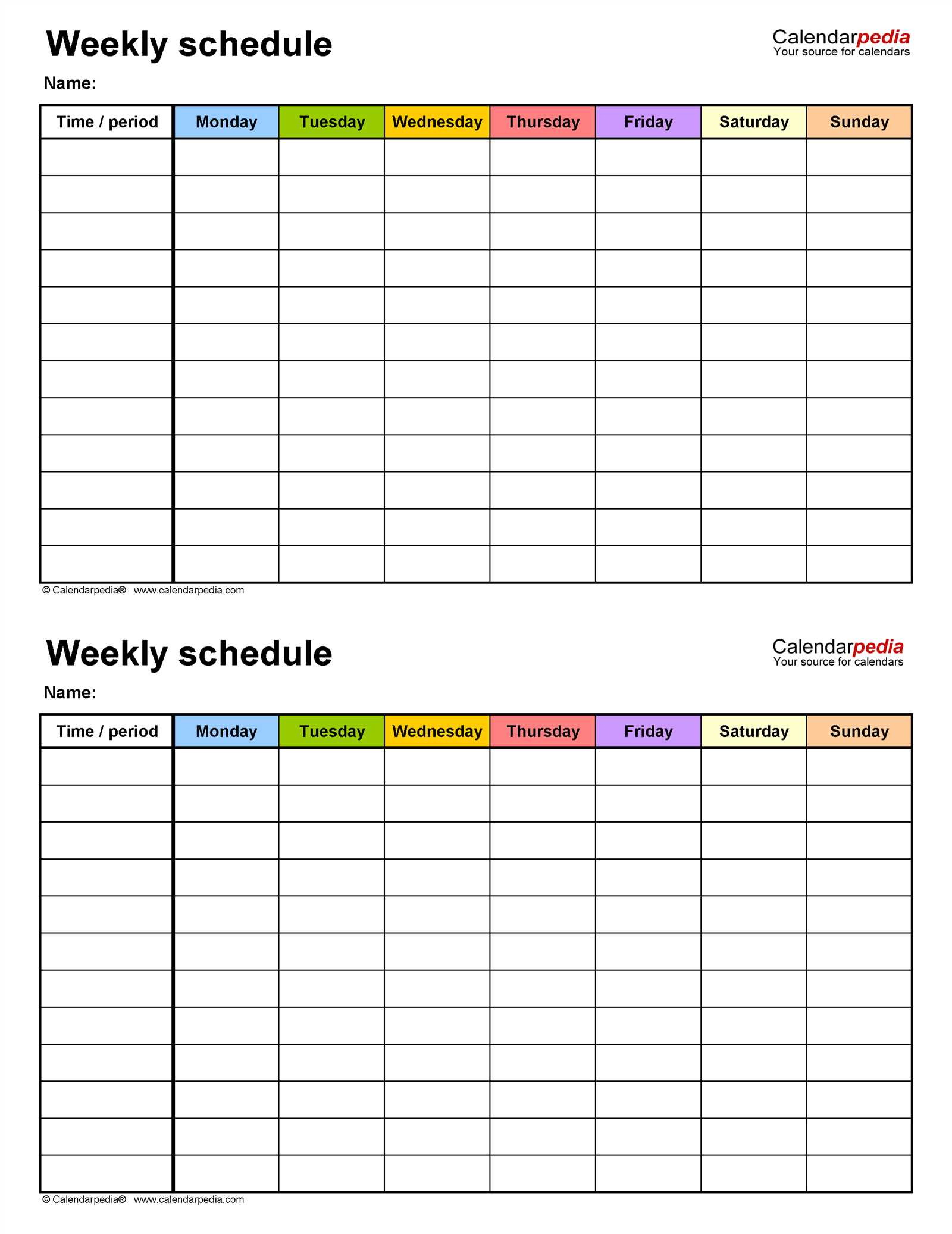
A well-structured planning tool can significantly enhance organization and time management. By incorporating essential elements, such a resource can effectively serve diverse needs, whether for educational settings or personal scheduling. Below are some crucial aspects that make these resources valuable.
Customizable Layouts
Flexibility in design allows users to tailor the arrangement to suit their specific requirements. Various formats, such as grid or list styles, enable individuals to choose a layout that best fits their preferences, enhancing usability.
Clear Visuals
Incorporating bold colors and intuitive icons helps to create an engaging experience. A visually appealing format not only attracts attention but also facilitates quick comprehension, allowing users to identify important dates and events effortlessly.
How to Customize Your Template
Adapting your planning layout can significantly enhance its effectiveness for your needs. Personalization allows you to align the structure with your specific requirements, ensuring that it serves its purpose efficiently.
Start by identifying the key elements you want to include. Consider factors such as color schemes, fonts, and layout styles. A visually appealing design can make the material more engaging, while a clear layout helps in organizing information effectively.
Next, incorporate relevant sections that reflect the activities or themes important to your context. This might involve adding unique categories or adjusting existing ones to better fit your schedule. Think about what information is crucial and how to present it in an accessible manner.
Finally, regularly review and update your design to adapt to any changing needs or preferences. Flexibility is key; as your planning evolves, so should your approach to structuring your resources. This ongoing refinement will ensure that your setup remains relevant and useful over time.
Printable Options for Preschool Calendars
Various formats for engaging visual planners can enhance the educational experience for young learners. By providing versatile printable resources, caregivers and educators can help children grasp daily activities and special events effectively. These formats cater to different needs, ensuring an enjoyable and organized approach to learning.
Types of Printable Formats
- Monthly Layouts: Ideal for tracking longer-term activities and events, allowing for a broader overview.
- Daily Sheets: Perfect for detailing specific tasks and events that occur each day, making it easy for children to anticipate their routines.
- Seasonal Themes: Incorporate seasonal elements to make learning more engaging and relatable, connecting activities to the time of year.
Customization Features
- Colorful designs that attract children’s attention and stimulate interest.
- Blank spaces for personalizing with drawings or notes, encouraging creativity.
- Pre-filled options for common activities to simplify planning for busy caregivers.
Digital vs. Paper Calendar Benefits
In today’s fast-paced world, individuals often face a choice between electronic and traditional planning methods. Each approach presents unique advantages that cater to different preferences and lifestyles. Understanding these benefits can aid in selecting the most suitable option for managing tasks and schedules effectively.
Advantages of Digital Planning Tools
Electronic planning solutions offer remarkable convenience and accessibility. Users can synchronize their schedules across multiple devices, ensuring that important appointments and events are always within reach. Furthermore, many digital platforms provide features such as reminders and alerts, which help maintain organization and prevent missed deadlines.
Benefits of Traditional Planning Methods
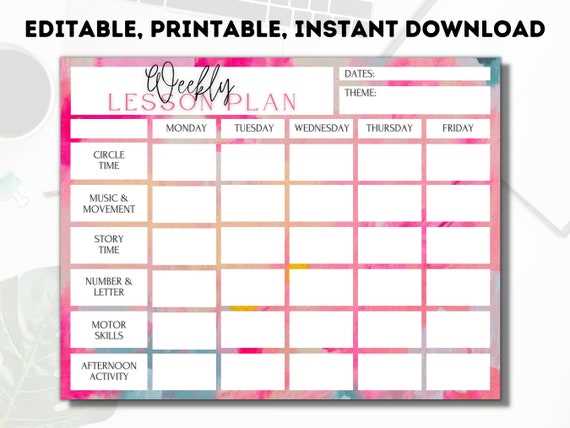
On the other hand, physical planners provide a tangible experience that many find satisfying. Writing by hand can enhance memory retention and foster creativity, making it easier to brainstorm ideas and set goals. Additionally, the absence of screen time allows for a more focused approach, free from digital distractions.
Using Visual Aids in Calendars
Incorporating visual elements into planning tools enhances comprehension and engagement. By utilizing images, colors, and symbols, individuals can better grasp the information presented. This approach caters to diverse learning styles, making it easier for users to navigate schedules and events.
Visual cues serve as effective tools for reinforcing memory and aiding in quick recognition. For instance, associating specific colors with particular activities can create a more organized and appealing layout. Additionally, using icons or illustrations can provide instant context, allowing for swift understanding without lengthy explanations.
Implementing these strategies not only enriches the overall experience but also fosters a more interactive and enjoyable process. Engaging users with visual aids encourages participation and helps maintain interest in their daily plans.
Incorporating Thematic Activities Weekly
Engaging young learners through themed experiences fosters creativity and enhances their understanding of various concepts. By integrating diverse activities centered around a specific theme, educators can create a dynamic learning environment that stimulates curiosity and encourages exploration. This approach not only captivates children’s attention but also promotes holistic development by blending play with learning.
Creating a Structured Approach
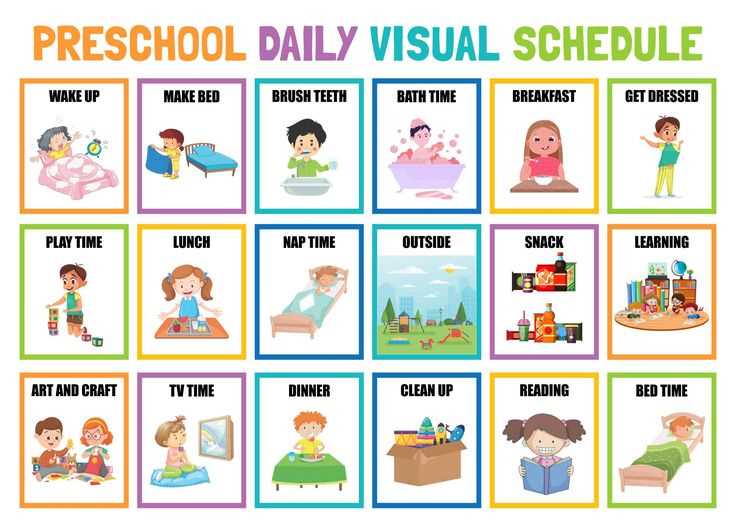
To maximize the benefits of thematic learning, it is essential to establish a clear framework. Begin by selecting a central topic that resonates with the interests of the children. For instance, a nature theme could include activities related to plants, animals, and environmental awareness. Organize the week’s experiences around this theme, ensuring a mix of hands-on projects, storytelling, and creative play to reinforce the concepts being taught.
Encouraging Participation and Interaction
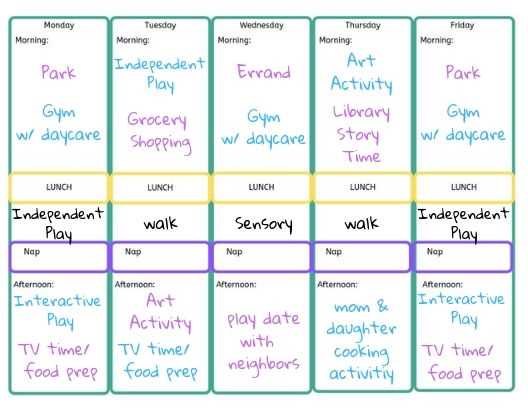
Fostering participation among young learners can significantly enhance their engagement. Incorporate group activities that promote collaboration and communication. For example, children can work together on a project, such as creating a mural related to the theme. This not only encourages teamwork but also allows them to express their understanding of the topic creatively. Additionally, integrating interactive discussions helps reinforce learning and allows children to share their thoughts and ideas.
Engaging Parents with Calendar Updates
Keeping families informed about daily activities and events is crucial for fostering a supportive learning environment. By providing regular updates, educators can strengthen the connection between home and school, encouraging parental involvement and enhancing student success.
Methods to Enhance Communication
- Utilize digital platforms to share important dates and activities.
- Create visually appealing newsletters to summarize weekly events.
- Incorporate reminders for upcoming gatherings and important milestones.
Benefits of Regular Updates
- Fosters a sense of community among families.
- Encourages parents to participate in school activities.
- Enhances parents’ understanding of their child’s daily experiences.
Tracking Progress with Calendar Templates
Monitoring development and achievements is crucial for any educational setting. Utilizing structured layouts can greatly assist in organizing activities, milestones, and assessments. These frameworks provide an efficient way to visualize schedules, ensuring that every participant stays informed and engaged.
By incorporating various methods of documentation, educators can easily evaluate the growth of individuals and the overall group. Visual aids not only enhance engagement but also offer a clear picture of progress over time.
| Activity | Date | Goals | Notes |
|---|---|---|---|
| Story Time | Monday | Enhance listening skills | Focus on participation |
| Art Session | Wednesday | Encourage creativity | Materials needed: crayons, paper |
| Outdoor Play | Friday | Develop motor skills | Weather permitting |
Creating a Routine for Young Learners
Establishing a consistent framework for daily activities is essential for fostering a productive environment for early education. A structured approach helps children understand expectations, enhances their ability to focus, and promotes a sense of security as they navigate their learning journey.
When designing a daily structure, it is important to consider the developmental needs of young learners. This includes incorporating a variety of activities that stimulate different aspects of growth, such as cognitive, social, emotional, and physical development.
| Time | Activity | Objective |
|---|---|---|
| 8:00 – 8:30 | Welcome and Free Play | Encourage social interactions and creativity. |
| 8:30 – 9:00 | Circle Time | Promote listening skills and group participation. |
| 9:00 – 9:30 | Story Time | Enhance language development and imagination. |
| 9:30 – 10:00 | Outdoor Play | Support physical activity and teamwork. |
| 10:00 – 10:30 | Art Exploration | Encourage creativity and fine motor skills. |
Incorporating varied activities within a routine ensures that young learners remain engaged and motivated. This balance allows them to explore new concepts while also practicing skills in a familiar context, ultimately aiding in their overall development.
Examples of Weekly Themes for Kids
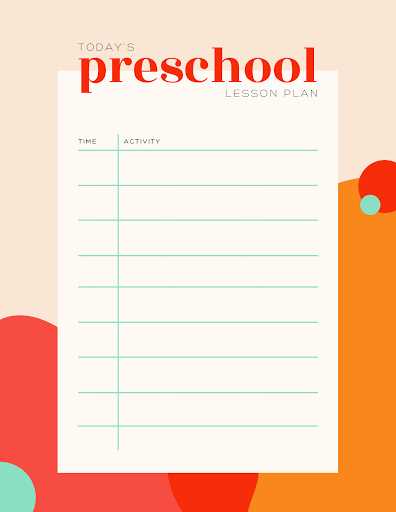
Engaging young learners with themed activities can enhance their experience and spark creativity. By organizing various topics throughout the week, educators can provide diverse learning opportunities that stimulate curiosity and imagination.
1. Nature Exploration: This theme can introduce children to the wonders of the natural world. Activities may include nature walks, leaf art, and learning about different animals and plants.
2. Space Adventure: Encourage children to explore the universe with lessons about planets, stars, and astronauts. Activities can include creating rockets, star constellations, and storytelling about space missions.
3. Under the Sea: Dive into marine life by exploring ocean animals, coral reefs, and underwater ecosystems. Crafts like making fish or creating ocean dioramas can complement this theme.
4. Community Helpers: Teach kids about various professions that help the community, such as firefighters, doctors, and teachers. Role-playing and visits from local heroes can make learning about this topic interactive and fun.
5. Around the World: Introduce children to different cultures, traditions, and cuisines from various countries. Activities can include cooking simple dishes, learning songs, and exploring traditional clothing.
6. Dinosaurs: Transport kids back to prehistoric times with lessons about different dinosaur species. This theme can include fossil digging, dinosaur crafts, and storytelling about their habitats.
Integrating Special Events into Calendars
Incorporating noteworthy occasions into planning tools enhances engagement and provides structure. Special days offer opportunities for learning and celebration, making them valuable additions to any organizational framework.
Benefits of Including Notable Occasions
- Enhanced Engagement: Recognizing significant events fosters enthusiasm and participation among children.
- Learning Opportunities: Events can serve as educational touchpoints, introducing various themes and cultures.
- Community Building: Celebrations and special days encourage social interaction, strengthening bonds among families and educators.
Ideas for Special Days to Incorporate
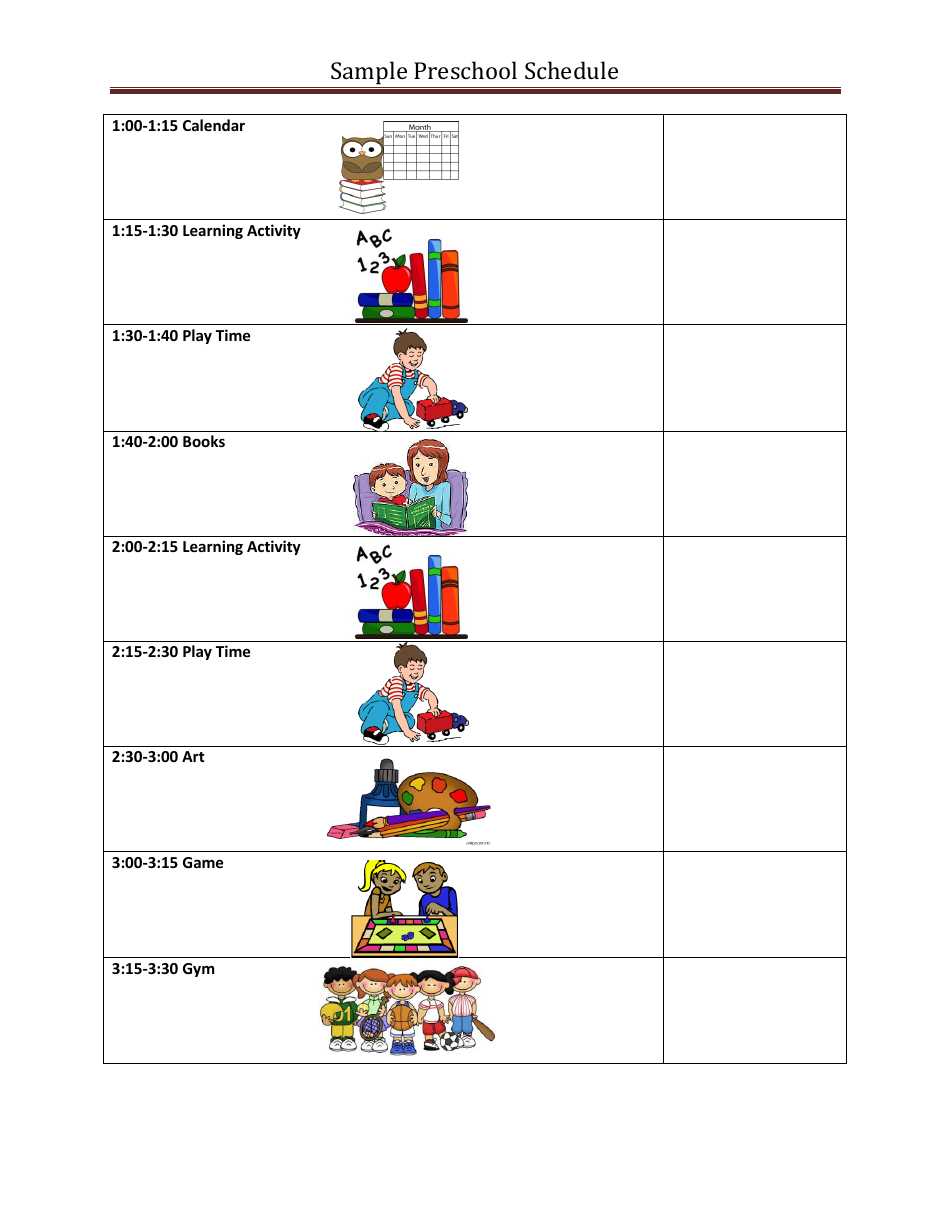
- Seasonal celebrations (e.g., holidays, solstices)
- Themed learning days (e.g., science day, art day)
- Celebration of cultural diversity (e.g., international days)
- Family engagement events (e.g., open houses, family picnics)
Adapting Calendars for Different Ages
When planning educational activities, it is essential to consider the developmental stages of children. Tailoring schedules to meet the varying needs of different age groups can significantly enhance engagement and learning outcomes. This approach ensures that the content is age-appropriate and caters to the cognitive and emotional capabilities of the children involved.
For younger learners, visual aids and interactive elements play a crucial role. Simple images, bright colors, and engaging themes can help capture their attention and facilitate understanding. On the other hand, older children may benefit from more structured and detailed planning, allowing them to take part in decision-making processes and learn time management skills.
| Age Group | Adaptation Strategies |
|---|---|
| 0-2 Years | Use vibrant colors, shapes, and textures; focus on sensory experiences. |
| 3-5 Years | Incorporate simple visuals and interactive activities; use songs and games. |
| 6-8 Years | Introduce more structured schedules; encourage self-directed activities. |
| 9-12 Years | Focus on planning and organization skills; involve children in creating their own plans. |
Tools for Designing Your Calendar
Creating a well-organized planner can significantly enhance productivity and streamline daily tasks. Utilizing the right resources can facilitate the design process and ensure that your planner meets specific needs effectively. Below are some essential tools to consider when crafting your personalized scheduling aid.
Digital Resources
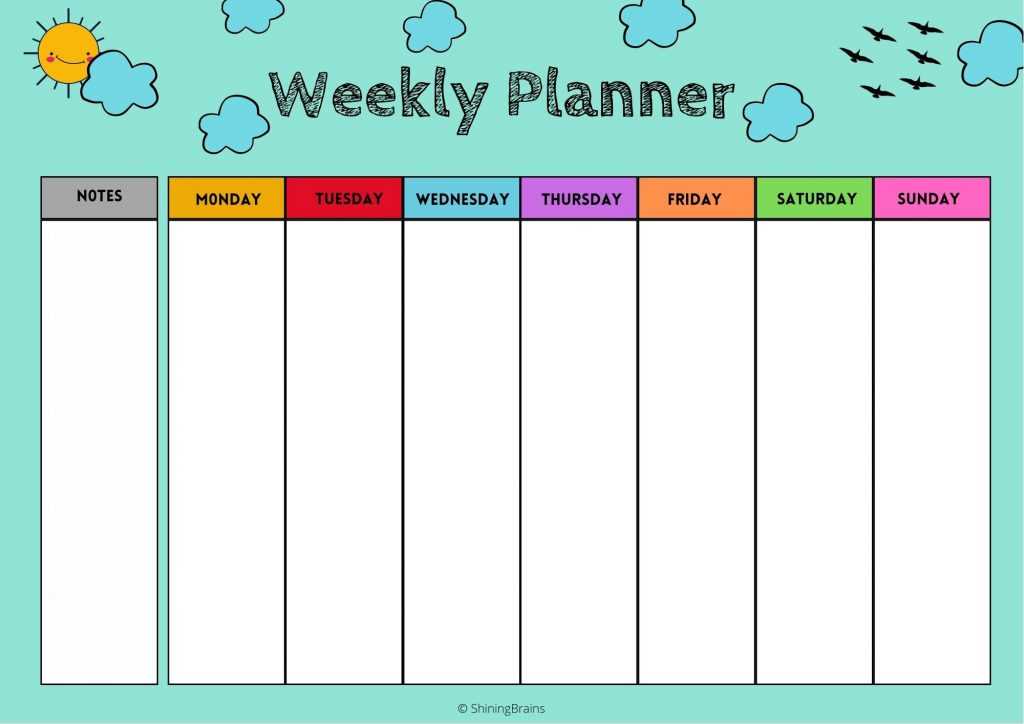
- Design Software: Applications such as Adobe InDesign and Canva allow for custom layouts and creative designs.
- Spreadsheet Programs: Microsoft Excel and Google Sheets offer templates and flexibility for organizing information efficiently.
- Graphic Editors: Tools like Photoshop and GIMP can help with image editing and graphic creation.
Physical Supplies
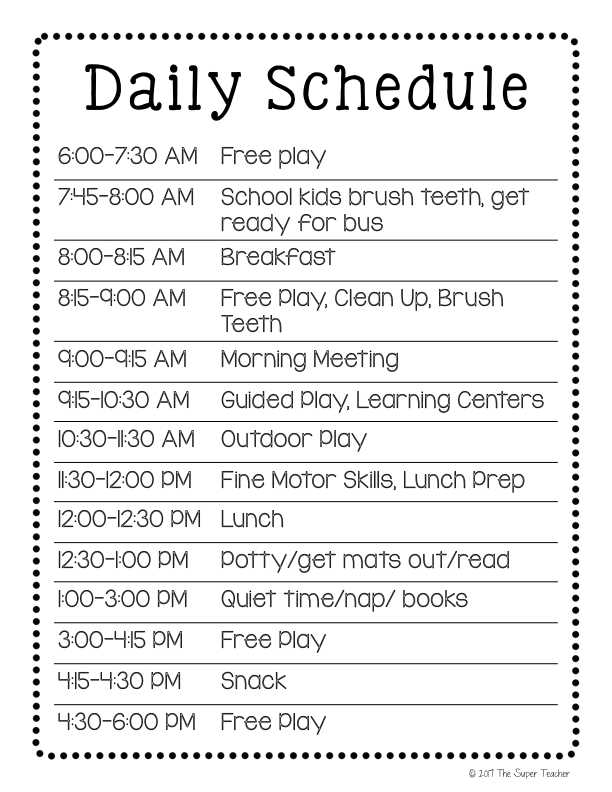
- Pens and Markers: Use a variety of colors to highlight different activities or themes.
- Stickers and Washi Tape: Decorative elements can make your planner visually appealing and fun to use.
- Paper and Binders: Choose high-quality materials for a more durable and professional-looking result.
Feedback Mechanisms for Continuous Improvement
In any educational setting, establishing effective communication channels for input is crucial for ongoing development. These channels enable educators to gather insights and suggestions, fostering an environment where adjustments can be made to enhance the learning experience. This section explores various methods to solicit feedback and utilize it for growth and adaptation.
Types of Feedback Mechanisms
- Surveys and Questionnaires: Tools to collect structured responses from parents and caregivers about their observations and suggestions.
- Focus Groups: Small, interactive discussions with stakeholders to dive deeper into specific topics and gather qualitative data.
- Suggestion Boxes: Anonymous submissions allow individuals to share thoughts without hesitation.
- Regular Meetings: Scheduled gatherings with staff and families to discuss progress and areas for improvement.
Implementing Feedback for Improvement
- Analyze collected data to identify common themes and areas needing attention.
- Develop actionable plans based on the feedback received, ensuring alignment with educational goals.
- Communicate changes and improvements to all stakeholders, reinforcing the value of their input.
- Monitor the impact of implemented changes to assess effectiveness and make further adjustments as necessary.
Collaborative Planning with Educators
Effective teamwork among educators is essential for creating a supportive and enriching environment for young learners. By engaging in joint planning sessions, educators can exchange ideas, share resources, and develop cohesive strategies that cater to the diverse needs of children. This collaborative approach fosters a sense of community and enhances the overall educational experience.
Benefits of Collaborative Planning

Working together allows educators to combine their expertise and insights, leading to more innovative and effective teaching methods. Additionally, this teamwork promotes consistency in curriculum implementation and helps in addressing the varying needs of students more effectively.
Strategies for Successful Collaboration
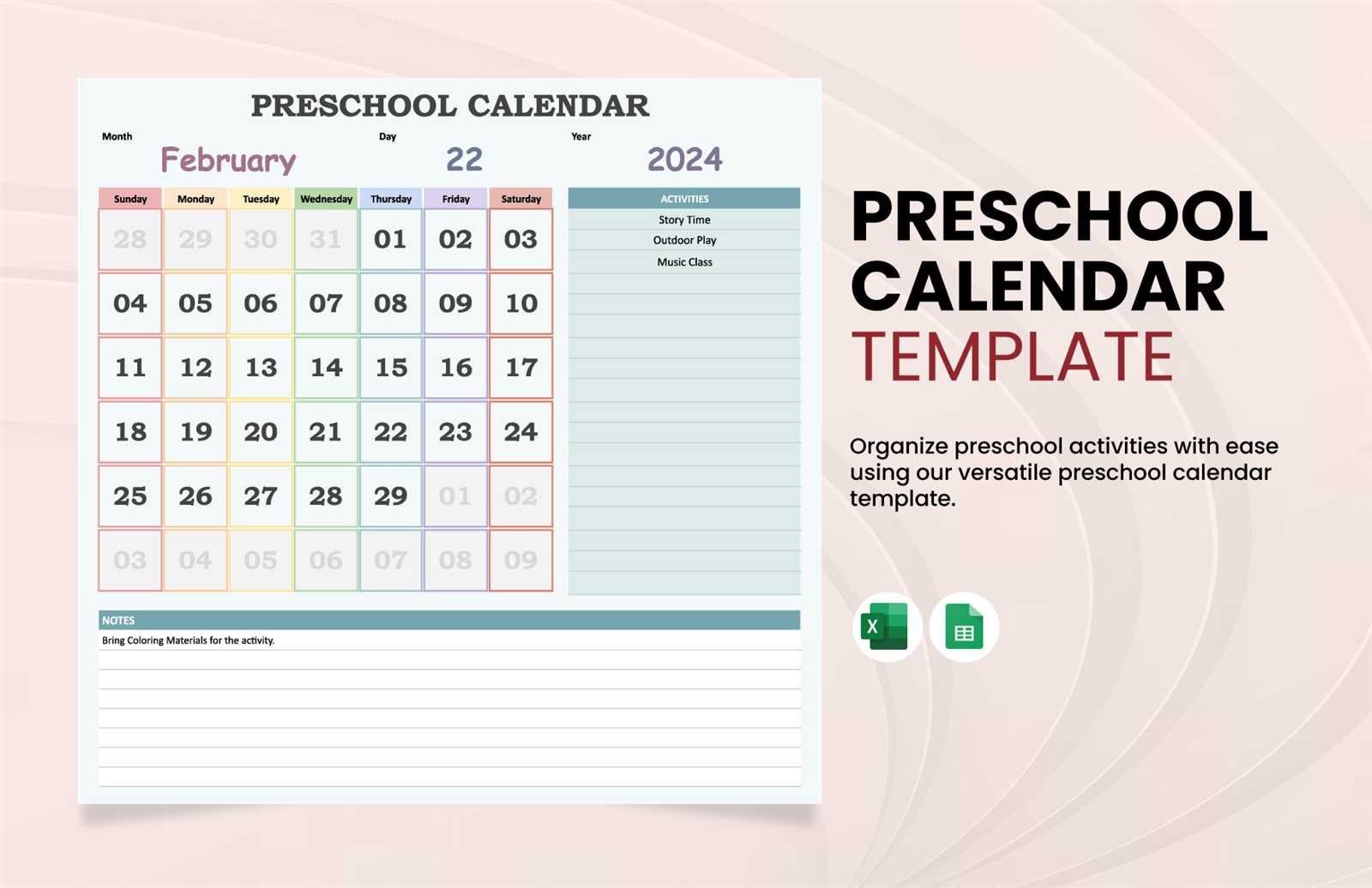
To facilitate productive collaboration, it is vital to establish clear communication channels and set shared goals. Regular meetings and workshops can provide a platform for educators to brainstorm ideas and reflect on their practices. Utilizing technology can also enhance collaboration by allowing educators to share documents and resources efficiently.
| Strategy | Description |
|---|---|
| Regular Meetings | Scheduled gatherings to discuss objectives and progress. |
| Resource Sharing | Exchanging materials and tools to support each other’s efforts. |
| Joint Workshops | Collaborative training sessions to enhance teaching skills. |
Resources for Finding Calendar Templates
There are numerous avenues to explore when seeking tools for organizing events and activities. Whether you are looking for customizable options or ready-made designs, various platforms and websites offer a wealth of resources to meet your needs. By utilizing these tools, you can effectively plan schedules, manage tasks, and enhance your time management skills.
Online Design Platforms
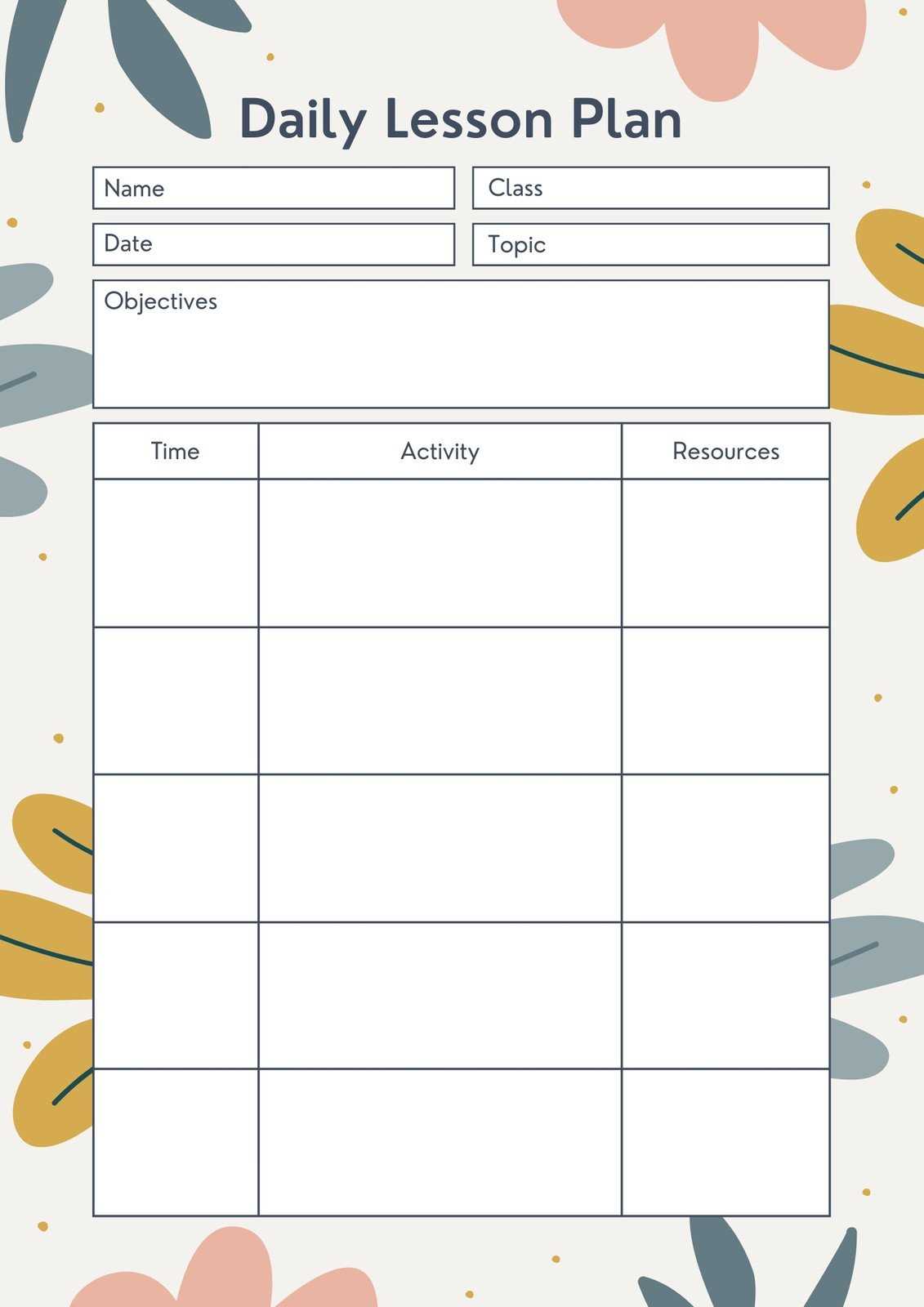
Websites that specialize in design often provide a variety of layouts that can be tailored to your preferences. These platforms usually feature user-friendly interfaces that allow you to modify colors, fonts, and structures to suit your specific requirements. With a simple search, you can find a plethora of creative options that cater to different themes and styles.
Educational Resource Sites
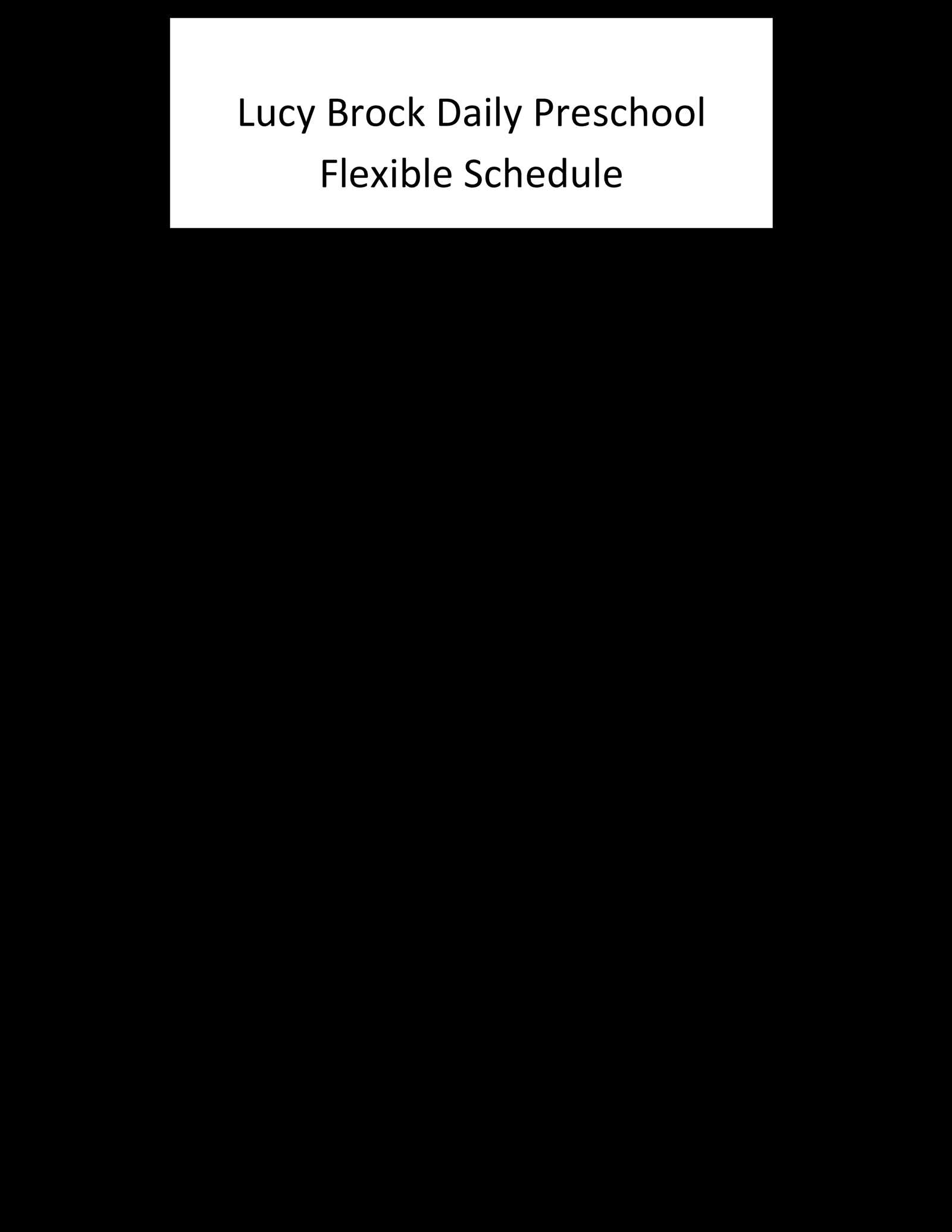
Many educational websites offer free resources that include planners and organizational sheets. These sites are particularly valuable as they often provide materials that are specifically designed for learning environments. Accessing these resources can help streamline planning processes and enhance the overall organizational experience.